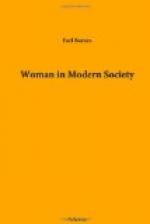[20] R. DE MAULDE LA CLAVIERE, The Woman of the Renaissance. A Study in Feminism, translated by George H. Ely. New York: C.P. Putnam’s Sons, 1900.
The Protestant Revolution went far to restore the special functions of women to respect. Belief in her individual soul, and in its need of salvation through individual choice, was supplemented by the belief that this choice must be guided by her individual judgment. Celibacy ceased to be a sign of righteousness; and the best men and women married. But beliefs cannot be directly destroyed by revolution; they can only be disturbed and modified. The teachings of Paul, Augustine, Tertullian and St. Jerome were still authoritative, and Calvin and Knox reaffirmed many of them. The family was still subordinate to the Church; and marriage still remained a sacrament, with theological significances, rather than the simple union of a man and woman who loved each other. The choice of a mate once made was final, because theological, and it could be broken only with infinite pain and disgrace.
The great political upheaval, which we call the French Revolution, carried in its fundamental teachings freedom and opportunity for men and for women; but like the corresponding revolution in religion, it required time to make adjustments, and so we have been content to live for more than a hundred years in the midst of verbal affirmations which we denied in all our institutional life.
In America, conditions have always been favorable for women to work out their freedom. Among the immigrants who came to our shores before 1840 there were, of course, a few traders, adventurers and servants who hoped to improve their financial conditions; but the leaders, and most of the rank and file, came that they might be free to think their own thoughts and live their own lives. If this selection of colonists, through religious and political persecution, sometimes gave us bigots with one idea, it also gave us people who knew that ideas can change. Along with Cotton Mather it gave us Anne Hutchinson, Roger Williams and William Penn.
Most of these who came in the early days belonged to extreme dissenting sects believing in salvation through individual choice, based on personal judgments. Preaching was exalted at the expense of ritual; and by substituting new thinking for old habits in religion, the American settlers made it less difficult for other adjustments to be made, even in such a conservative matter as woman’s position. It is through no accident that Methodists, Friends, Unitarians and the Salvation Army have been much more sympathetic to woman’s progress than have the older ritualistic faiths.
And these theological ideas had to be worked out under the material conditions of the New World, which were also favorable to the emancipation of women. Facing primitive conditions in the forest, it became a habit to do new things in new ways. Woman’s work and judgment were indispensable; and these picked women showed themselves capable in every direction. They did every kind of work; and when it came to enduring privation or even to starving, they set an example for men.




